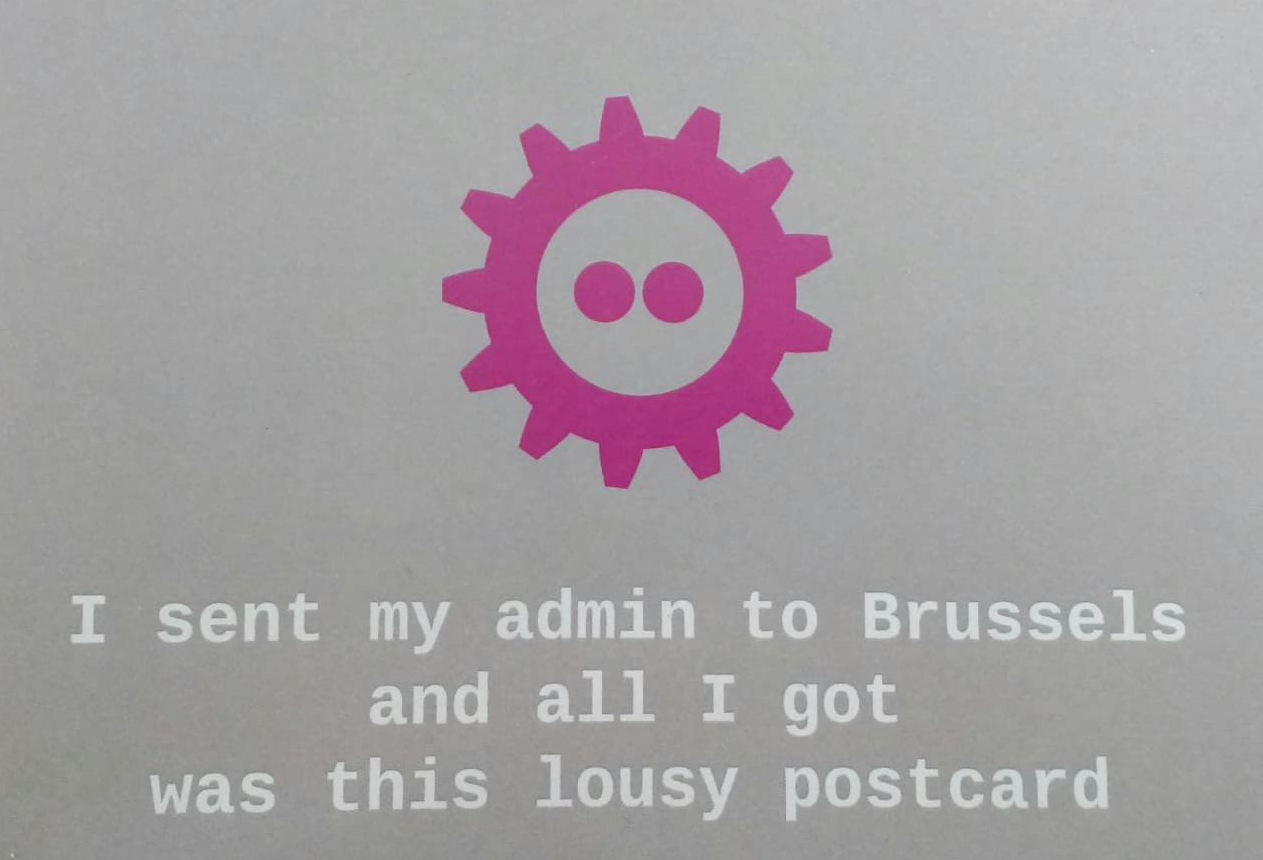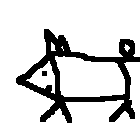FOSDEM 2019

What is FOSDEM
Fosdem is a weekend event which takes place at the Universite Libre de Bruxelles in Belgium. It is a conference entirely made by volunteers. Most of the work during the conference is done by a large, enthusiastic group of people who donate their time to make Fosdem happen. The organizers are also encouraging people to volunteer in their spare time to help introduce the speakers, run the cloakroom and infodesks or clean up after the event [1]. I tried to volunteer too, but unfortunately there was no work needed at that moment.
Fosdem is free to attend. The event is organized by volunteers and funded entirely by sponsors, the sale of t-shirts and individual donations.
Talks
It was my very first time on Fosdem, so Saturday morning at 9AM I was already seated in the big auditorium Janson, waiting for the welcome and the first keynote.
1st keynote: Can anyone Live in Full Software Freedom Today? Confessions of activists who try it but fail to avoid proprietary software. -Karen Sandler and Bradley M. Kuhn
This talk was presented by Karen Sandler - the executive director of the Software Freedom Conservancy and Bradley M. Kuhn, who is a free software activist and president of the Software Freedom Conservancy - the organization that provides a non-profit home and infrastructure support for free/open source software projects and also runs the Outreachy program since February 2015.
The talk was aimed on the struggles of somebody who wants to use only free software and how to face those struggles. Bradley mentioned that in early years of 2000 there was a “golden age of free software”. It used to be easy to be fully commited to open source software but it gradually became more difficult to live a life with only free software as a lifestyle and personal decision. This caught my attention and I had to read more about the free versus proprietary software and the differences between the philosophy of free software and open source software. And other important questions like copyright versus copyleft and how the programmers actually get paid :)
Karen described the tricky questions of her everyday life, when she is bound to use a defibrillator with proprietary software because of her heart condition. There are difficult moments of choice between personal safety and using non proprietary software. Safety for example of not being shocked randomly with the defibrilator, especially while possibly pregnant.
They stated that asking others to use proprietary software is as bad if not worse than using it yourself. There is a paradox: the more free/open source software there is, the less software freedom we actually have in our technology. To study further the philosophy of free software movement it’s useful to read this wiki article.
People of free software movement are rasing awareness and making people think about the ethical choices. The exposition of free software makes it less likely that the software would be designed to spy on users or to mistreat them. It is important to make mindful choices, even if you sometimes use proprietary software. They mentioned following suggestions:
- make small choices that support free software
- there is no need to let shame paralyze you while using proprietary software sometimes
- don’t let the problems we face overwhelm you into inaction
- reprioritize you foss development time, not that many people spend significant amount of time developing free software, but Linux also started as a small volunteer project
- try to convince community and companies
- support each other, talk honestly
Another talk I attended was Designing Command-Line Tools People Love from Carolyn Van Slyck. Carolyn is a senior software developer from Microsoft’s Azure team. From her talk I learned some tips about making neat and useful command line interface tools, which is what my project is about.
Nicely designed CLI tools should be:
- predictable
- task oriented, which means understanding what the user is doing and making it easier, one simple command for sets of things
- friendly to both humans and scripts
Carolyn reminded some good practices about creating a CLI, for example thinking about the command
design. Command grammar should be chosen wisely, let’s say:
Another important thing is to understand the precedents in your ecosystem => svcat follows kubectl, dvm (docker version manager) followed nvm (for a while) and so on. And some advices about the packaging:
- make functions that are 1:1 the commands in your CLI
- create happy little packages for everything
- hide your band-aides and API wrappers in here
The next talk I attended was in the Mozilla devroom: Inclusion includes you Let’s talk about how inclusion benefits all of us from Ali Spivak, who is a director, developer ecosystem in Mozilla. The talk was about reaching diversity in free software communities. She raised a question: Isn’t the focus on diversity limiting for other poeple? There is lot of unfilled coding jobs - of skilled coders, qualified, but less than half has a degree in computer science. While more than half is self taught. Job seekers often want the degrees.
Inclusion means getting the mix of different people to work and respect those differences. Making sure nobody feels like they are sitting on the outside.
- monocultures are usually not as healthy as diverse communites
- there are risks of conflict, good communication is necessary
The most occured form of discrimination in tech is actually ageism. In tech world, old means 40, average age of a developer is 28.
From the other talks I attended:
- Building modern desktop apps in Go from Serge Zaitsev
- Hands on debugging with Delve from Derek Parker
- Automate Kubernetes Workloads with Ansible form Michael Hrivnak
- When perf-html Met A11y from Eva Dovc, who is an Outreachy intern in Mozilla
And of course I could not miss the Sunday morning talk of Sage Sharp, the Outreachy coordinator, about Supporting FOSS community members with Impostor syndrome: Mentoring and supporting peers with impostor syndrome.
They mentioned that marginalized people are more likely to experience impostor syndrome and raised a question: Who looks like a contributor to priviledged people? An impostor syndrome creates feeling like all accomplishments are due to luck, people see themselves as faliure, like if everyone knows more than you. Everything they do must be perfect, they polish their pull requests till perfection. They hesitate to ask questions. Why don’t people ask? For the asnwers like RTFM, google it.
I quite recognized myself in the description of typical talks from IS affected people in those times when I was presenting during my PhD studies, but by that time I didn’t know about it. It seems to me I was quite typical example with removing ambiguities, using very technical language, authoritative presentation which tries to avoid doubts, questions and discussion. And presentations like this might actually induce impostor syndrome in other people.
Sage stated that possible solution is to model uncertainty: “I don’t know how to do this”, “I don’t know if this might work”, “It might be buggy”, “I don’t understand a word or concept”. Another way to help is to normalize asking questions:
- put forum links in your documentation
- ask “What questions do you have?” not “Do you have any question?”. And praise the efforts, not the static characteristics. No “You’re so smart”, but “You put so much effort into this” instead. Ask poeple to share their resources, acknowledge the process of creation. Use “I appreciate”, or “I feel” rather than “Thanks for the talk”
Well, Fosdem was a nice, crowded experience, with some queuing for the talks, but always empty women toilets.
[1] Source: Fosdem booklet
